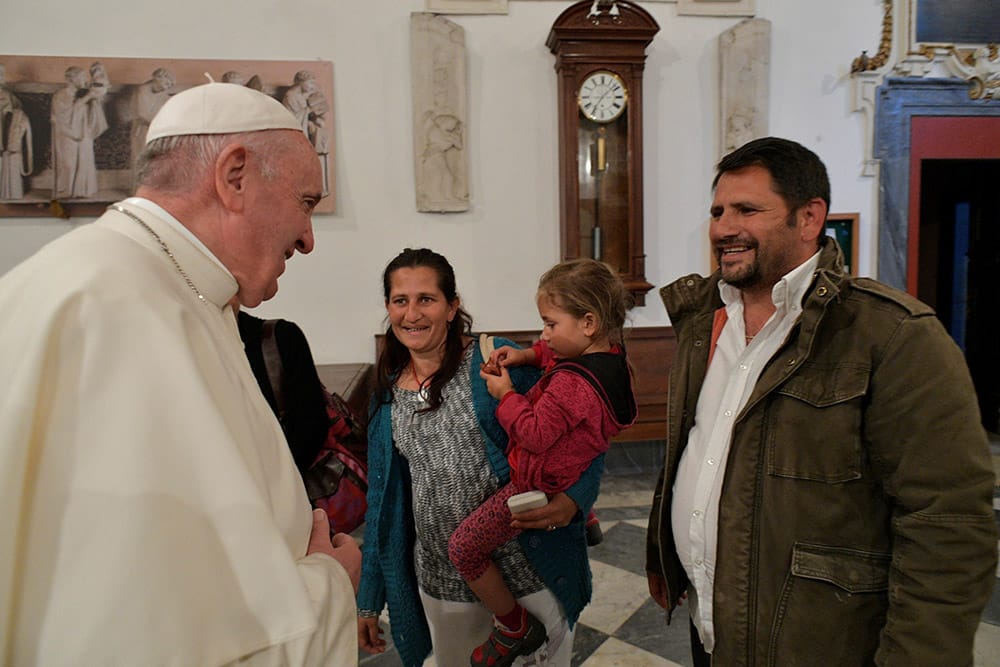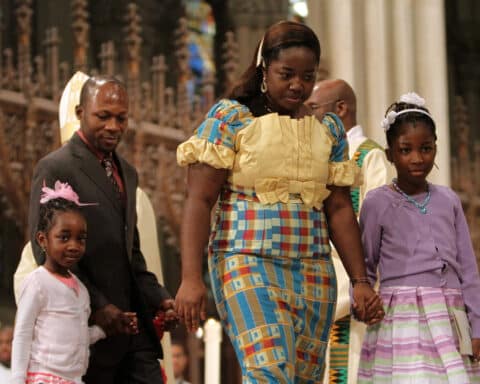After surprising the Church only a few weeks ago with the announcement of a Year of St. Joseph, which began Dec. 8, 2020, and lasts until Dec. 8 of this year, the Holy See made a related announcement on the Feast of the Holy Family. On Dec. 27, the Dicastery for Laity, Family and Life promulgated another special year: this one to “bear witness to family love.”
Beginning on the feast of St. Joseph on March 19 — which is also the fifth anniversary of the signing of Amoris Laetitia, a post-synodal apostolic exhortation on marriage and family life published in the wake of two synods that took place in 2014 and 2015 — the year on family love, technically called Year “Amoris Laetitia Family,” will conclude on June 22, 2022. It will culminate with the occasion of the World Meeting of Families 2022 in Rome.
According to the dicastery’s announcement, the family “deserves a year of celebrations, so that it can be placed at the center of commitment and care from every pastoral and ecclesial reality.” It added that the year “aims to reach every family around the world through several spiritual, pastoral and cultural proposals that can be implemented within parishes, dioceses, universities, ecclesial movements and family associations.”
In celebration of the year, the dicastery is encouraging five approaches: that the content of “Amoris Laetitia” be more widely shared; that the sacrament of marriage be proclaimed as a gift that contains the “transforming power of human love”; that families be enabled to actively evangelize and catechize their own members from within; that young people are made more aware of “formation in the truth of love and in the gift of self”; and that outreach be extended to all members of the family, from young to old, in all walks of life. In all ways, it is seeking to extend and promote the message of family life found in Francis’ apostolic exhortation.
Amoris Laetitia is not a controversy-free document. Much has been made of Pope Francis’ seeming pastoral accommodation regarding the availability of the sacraments for the divorced and remarried in one of the document’s footnotes, and there will be some who will immediately dismiss this year and its opportunities because of it. Yet despite the pages upon pages of analysis written about paragraph 351 and its accompanying annotation, to ignore a concrete opportunity to focus on, encourage and strengthen family life, especially during this time of pandemic, would be detrimental to the mission of the Church.
Indeed, while Amoris Laetitia may have its challenging passages, the exhortation is, as the Our Sunday Visitor Editorial Board wrote in 2016, practical, accessible and “highly effective … for encouraging and inspiring couples and families in the trenches of everyday life.” It is, we said, “rich in practical advice and conveys a real understanding of humanity in all its successes and failings.” We added that the document “will be effective in offering support to couples and families and in renewing and sustaining their efforts to live as Christ intends.”
Five years on, as the challenges facing family life have become more acute, these statements remain true. For decades now, the number of people getting married in the Church has become fewer and fewer, and the decline extends to the number of children who are baptized. Many of those who do get baptized are not well formed in the Faith, and we know that by the end of high school, many of them will have left the Church. In recent years in this country, we also have seen the redefinition of marriage and the elevation of a cultural idea of “gender” over biological sex.
Faithful, well-catechized families are critical to the mission of the Church and can help to reverse these trends. Within the family, the Gospel is lived out and passed on in word and in deed. Vocations are introduced. Virtue is nurtured. This most basic cell of society is where the Faith can flourish, if it is properly tended to. And if there’s anything the coronavirus pandemic has taught us about family life, it’s that most of the time, we’re not giving it proper attention. As COVID-19 has forced us to slow down and be together, we are reminded that building up our domestic churches should be a priority.
This is the potential that the Year “Amoris Laetitia Family” brings with it. May we allow it to be a blessed time.
Our Sunday Visitor Editorial Board: Gretchen R. Crowe, Scott P. Richert, Scott Warden, York Young





